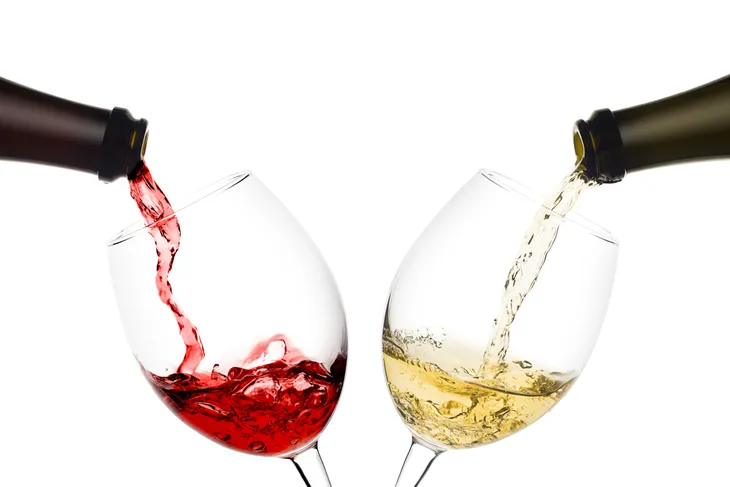When you’re reaching for a glass of vino at the end of a long day, do you reach for white or savor red? Most of us have a favorite when it comes to red or white wine. For instance, while red vintages reportedly offer more heart healthy advantages—don’t discount the health merits of white wine just yet.
Let’s find out which vintage offers the most health benefits…
Calories and Carbohydrates
You don’t have to whine about the calorie and carbohydrate differences between your favorite vintages—red and white wines are pretty much neck in neck (or rather stem to stem) when it comes to calorie content and carbohydrate nutritional values.
You’ve likely been told that white wines promise a few less calories per glass. However, it’s only a very slight difference with most white wines containing 2 to 4 calories less per 5-ounce glass.
Sugar Content
When it comes to sugar content, red wine weighs in as the lighter vintage—with 0.9-grams of sugar per 5-ounce glass (compared to 3.8-grams of sugar in the same glass of white wine).
If you’re looking to cut sugar from your diet, red wine might be your better bet. Remember, the sweeter the vintage—the more sugar in the bottle.
Tannin Sensitivity
Still, many folks reserve their glasses for white wine because of tannins sensitivities. These naturally present compounds come from grape skins, which stay intact and ferment in red vintages.
Tannins in grape skins and seeds are what lend red wine its signature robust color, full body, and dry flavor.
Red Wine and Heart Health
Research from the Linus Pauling Institute at Oregon State University claims that drinking red and/or white wine in moderation lowers the risk of coronary artery disease by up to 30-percent.
Although both red and white vintages are credited with protecting the old ticker from atherosclerosis, it’s red wine that delivers the finer goods when it comes to antioxidants, which are directly linked to protecting the arteries. Additional studies from the National Institutes of Health link polyphenols in red wine with lessening fatty deposits along the artery walls.
White Wine Produces Less Hangover
According to the U.S. Department of Agriculture’s (USDA) Nutrient Database for Standard Reference, both red and white wine will have a fair share of vitamins and minerals.
However, if you’re choosing a wine for a party, you might want to reach for white because it contains less congeners—the chemical byproducts present in alcohol fermentation that directly induce the pounding headache and nausea of a nasty hangover.
Red Wine and Cancer Prevention
Red wine gets a cask full of attention when it comes to fighting cancer. For instance, studies from the Linus Pauling Institute point out that red vino is rich in resveratrol, an antioxidant that fights cancer by blocking actual cancer cell growth.
However, keep in mind that for breast cancer prevention, research from the University of Wisconsin points their corkscrew directly at white wine.
White Wines and Lung Health
You’ll want to stock up your cellar with white wine due to its positive antioxidant effects on the lungs.
A 2002 study from the University at Buffalo School of Medicine, tied moderate white wine sipping to better lung health and lower instances of lung disease.
Drink Red and White Wine in Moderation
Cheers to lovers of red wine—sorry white wine sippers—but a robust glass of red has less sugar and more vital minerals and antioxidants per swig. Red wine takes the cask when it comes to heart-protecting polyphenols and cancer-blasting resveratrol.
Either way, drink red wine or white if it is your personal preference. Just be aware that the Harvard School of Public Health advises you to sip in moderation—that’s two drinks per day for you dapper gentlemen and one drink per day for you sophisticated ladies.











